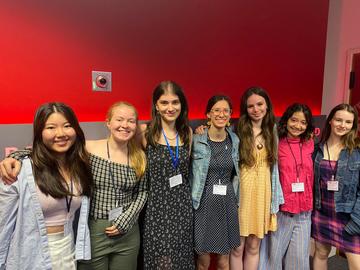A group from the Department of Chemistry have written about their experience campaigning for free period products in departmental bathrooms in an article published today in the journal Trends in Chemistry.
Before October 2022, period products were available in some of the department’s female bathrooms, but they were more expensive than products sold elsewhere. And while food vending machines in the department had been updated to take card payments, the
department’s period products still needed to be purchased with coins.

The team behind PERIODically, which includes the authors of today’s article in Trends in Chemistry. Left to right: Manami Imada, Charlie Simms, Josie Sams, Sofia Olendraru, Felicity Smith, Elba Feo and Amy Berger (plus Lottie Oliver, not pictured).
“In the worst-case scenario, a student needing period products would have to ask peers for spare coins or products or leave the department to find or buy products elsewhere. Both options are stressful alternatives and often not compatible with the high
number of contact hours a chemistry degree involves,” write Elba Feo, Sofia Olendraru and Charlie H. Simms, three Chemistry students in the department who are part of the team behind the podcast PERIODically,
and Dr Michael O’Neill.
Inspired by a 2018 report from the Royal Society of Chemistry, the students lobbied to make free period products available
to all chemistry students and faculty. Pads and tampons were made available in open baskets near the sinks of female bathrooms beginning in autumn last year.
So far, the feedback has been positive. “Students feel supported, especially during long lab sessions where the few short breaks make it difficult to mitigate period emergencies if products are inaccessible,” writes the team. The authors hope that their
project can inspire other university departments to take this first step towards inclusivity.
This work was supported by funding from the Royal Society of Chemistry. You can read the team’s article in Trends in Chemistry here. Listen to the PERIODically
podcast, and find out news about their second series, here.